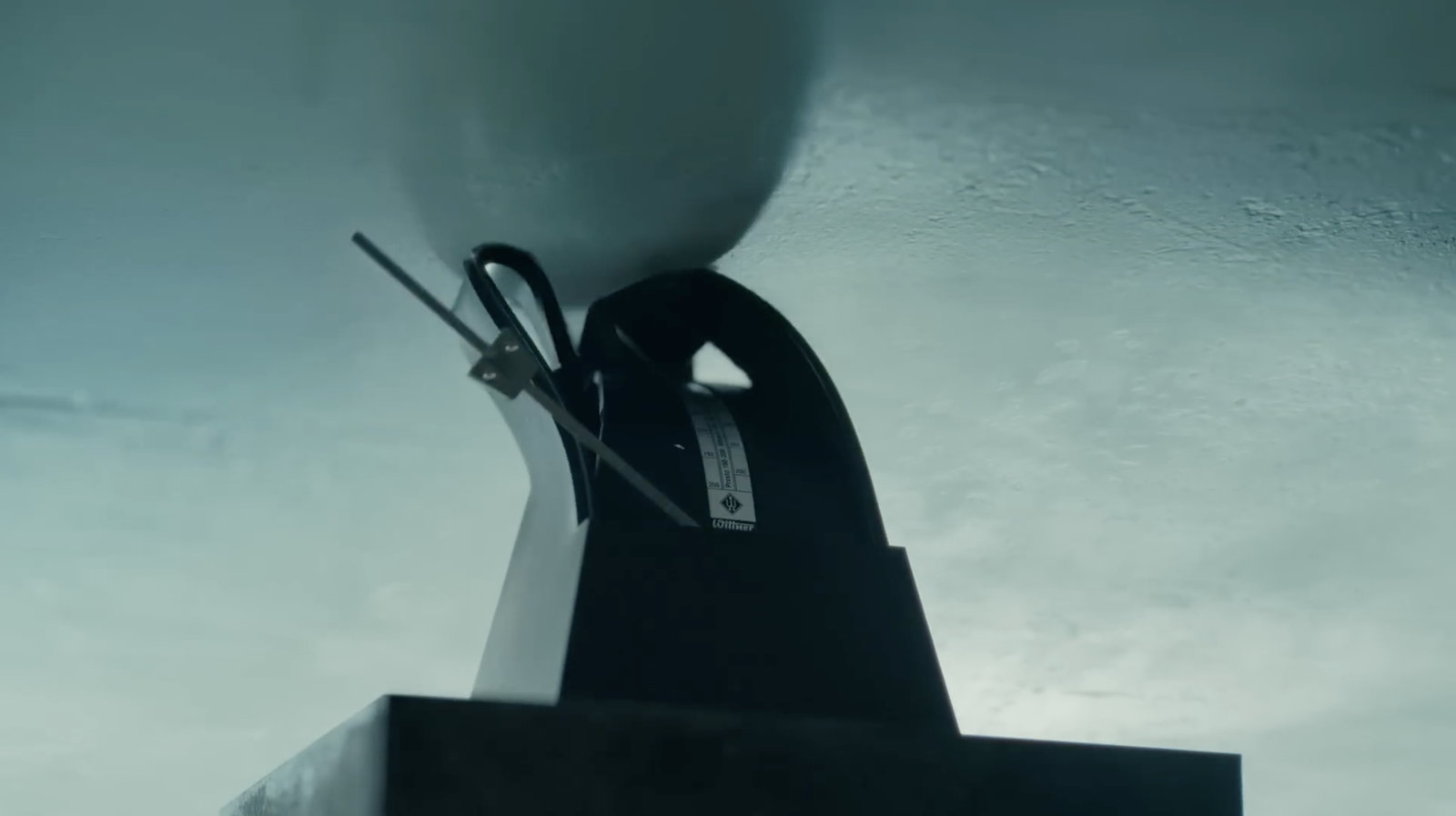Apple’s FiVe Minute Crush

How out-of-touch do you need to be to see this as an uplifting, inspiring end to an ad featuring the destruction of human-like dolls and faces?
I didn’t mean to do two AI-related posts practically back-to-back like this, but Apple’s very dystopian iPad Pro ad brought up some other thoughts partly due to my having almost finished posting my series on Alan Moore’s dystopian V stories.
Now, I’d recommend not reading too much into this “interesting” choice of visuals. Part of the problem with the ad is nothing more than the age-old development of silence culture in any large and entrenched business. Apple is far from the brotherhood of pirates portrayed in Andy Hertzfeld’s Revolution in the Valley. I suspect a lot of people saw how painfully bad the ad was and simply chose not to stick their necks out.
My first encounter with this culture, in a very similar situation, was tangentially, by way of a Radio Shack toy called “Galactic Man”. I could have sworn I’ve mentioned this on the site before but I can’t find it now. When I was a young guitarist in Hollywood, I worked part-time at a Radio Shack near Hollywood and Vine. It was a fascinating view of the Hollywood industry from the borderline: desperate property masters would occasionally come in searching for some thing they suddenly realized they needed, like a giant gold-plated telephone or a boxful of D-cell batteries they’d run out of on set.
The store’s manager kept a box of unsaleable items in the back room. As an employee, you were free to take anything you wanted out of it. That’s where I found Galactic Man. Galactic Man was a transformer knock-off. He was a laser gun that transformed into a robot. It was actually kind of cool, except for one possibly insurmountable problem: where does the laser gun’s trigger go when the toy transforms into a robot?
Pull the trigger, and Galactic Man lit up and made a whoop-whoop noise, just like he did in laser form. Frankly, just like any self-respecting robot would when someone fiddles his IO device.
Everyone who saw the robot form of the toy had to have seen where the trigger ended up on the robot. No one wanted to be the one who mentioned it.
I’m sure some people at Apple saw how Apple’s ad would be viewed as a destruction of the arts rather than a culmination of them. It’s hard to miss when the arts are spurting blood all over an industrial press as it crushes them lifeless and pops their eyeballs out.
Those employees chose not to stick their heads out and mention the obvious. But there was still the other culture, the one that thought that making an ad that is literally a visualization of just about every dystopian novel of the past century was a good idea. The culture that thinks destroying the tools of human creativity is the way of the future.
As it turns out, I’m not just posting an Alan Moore V for Vendetta study. I’m also rereading 1984. What’s weird is how incredible this ad could have been. In reverse, this is Apple’s 1984 ad all over again. The way they aired it, it is 1984. It is literally “A boot stamping on a human face forever.”
Or, in this case, an industrial press stamping on the diverse human arts and mashing them into a solid grey square that looks just like every other solid grey square out there. I half expected Charlton Heston to start yelling “iPad Pro is people!”
I’m not sure you could get any more dystopian than this without killing real people, as opposed to the human stand-ins on the arts table, the sculptor’s mannequin and the bouncy heads. That said, I still didn’t expect the backlash when I saw this ad for the first time.
My own reaction was mostly disappointment. Practically every one of those items in the ad are overflowing landfills everywhere. You can’t pay people to take a piano. The used-book market has dropped through the basement and is plummeting toward a flaming demise at the center of the Earth. That’s the heart, I think, of much of the reaction against this ad. We’re living in a world where these kinds of human arts are being destroyed all around us, both metaphorically in the sense that they’re filling landfills and actually, in the censorship of older works.
It’s in autotune stamping real singers and AI illustrations stamping real artists and computer generated content stamping real writers—while in every case keeping the listener, the viewer, the reader, in the dark.
We’re inundated by this darkness every time we search for information. Instead of actual information we get vague crap designed not to answer our questions but to keep us scrolling through one more page of ads. If you’ve tried to search for vintage recipes in the last few years, you’ve seen this: the highest-ranking results don’t show you the actual recipe until you’ve scrolled through what looks like generic, computer-created unspeak for several pages, at which point you can’t really trust the recipe because it’s unlikely a human has ever interpreted it.
AI has literally been programmed to erase and rewrite the past, even, in Google’s case, to the point of erasing the racism of Nazi Germany. And it was programmed to do this by humans who think they know better what the past and what the arts should be.
Just about every other movie or television series today is a remake of some older work, with the heart of that older work stamped and mashed and crushed to the point where if it says anything at all—and usually it’s just incoherent after such bowdlerism—it says the opposite of what it originally said.
Much like Apple and Google, who have each long since given up on “Think Different” and “Don’t Be Evil”.
This ad is awfully close to the world Apple warned us about in 1984. And given Apple’s part in that world, it makes the ad come across as gloating, as the final session in Room 101 before we spend our days drinking Victory Gin in the Chestnut Tree Cafe while plotting chess games that neither begin nor end. Not knowing why two plus two is five, only that the Party says so, and the Party assures us that that’s enough.
In response to Apple’s spinning mirror: exploiting children for dictatorships: Apple has decided on “child porn” as the root password to disable privacy on their phones. But the system they’re using appears to be mostly worthless at detecting the exploitation of children, and very useful for detecting dissent from authoritarian governments.
dystopias
- Crush! | iPad Pro at Apple Computer
- “Introducing the all-new iPad Pro. Outrageous performance by the first-ever M4 chip. With the breakthrough Ultra Retina XDR display. All in the thinnest Apple product ever. iPad has never been this powerful. Or this thin.”
- Daily Tech News 10 May 2024: Pixy Misa at Ace of Spades HQ
- “If someone can take your ad and produce a gem just by running it in reverse you might want to reconsider your entire existence.”
- Hugh Grant eviscerates new iPad Pro ad for promoting the ‘destruction of the human experience’: Tom Murray at Independent
- “Meanwhile, British filmmaker Asif Kapadia (Senna) wrote: ‘Like iPads but don’t know why anyone thought this ad was a good idea. It is the most honest metaphor for what tech companies do to the arts, to artists musicians, creators, writers, filmmakers: squeeze them, use them, not pay well, take everything then say it’s all created by them.’”
- If you thought THIS iPad ad was weird…: Luke Barnett
- “…you should have seen the first cut where they lined up all your favorite characters and shot them.”
- Macintosh 1984 commericial
- Macintosh’s 1984 ad riffing on 1984. “Today we celebrate the first glorious anniversary of the Information Purification Directives. We have created for the first time in all history a garden of pure ideology, where each worker may bloom, secure from the pests of any contradictory true thoughts.”
- Review: 1984: Jerry Stratton at Jerry@Goodreads
- “We shall meet in the place where there is no darkness.” It is fashionable to compare Orwell unfavorably to Huxley nowadays, but that’s mostly because Orwell’s message of voluntary repression is a much more difficult one than Huxley’s drug-induced repression.
history
- Artificial Intelligence Meets Tex Avery
- Will artificial intelligence degrade our own intelligence? So much of AI “contribution” to our decision making isn’t just wrong, it’s obviously wrong.
- The Fifth Face of V: I Have Saved You
- Time brings progress and it brings suffering. Can humanity be saved from the latter without losing the former? How much can we turn over to machines or governments before we are no longer human or free?
- FiVe Faces of Alan Moore’s SaVior
- V, Veidt, and Constantine are very much the same person, each ushering in a new era of human greatness through their own devious means. Even Promethea and Faust, and Moore’s interpretation of Jack the Ripper, share that vision to a lesser extent. What do these five faces of the same man mean?
- Review: Revolution in the Valley: Jerry Stratton at Jerry@Goodreads
- An inexpensive, turnkey system from Apple? Perhaps not. Unlike its predecessors that were designed by one or two individuals with a vision, or by a corporate team with a spreadsheet, the Macintosh ended up with a team of brilliant, hero-worshiping kids who knew exactly what couldn’t be done… and how to do it.
Reversals
- Crush! iPad Pro Apple REVERSED: Josh Surface
- “I can’t stop loving you.”
- FIXED: Apple iPad Pro Ad Crush: Jarmo Valmari
- “One fact Apple needs to know: the guitar, trumpet, piano and a few other objects in the ad will work without electricity and network connection.”
- Hey @Apple…: Reza Sixo Safai
- “…I fixed it for you.”
- Look if you reverse that iPad advert…: John Chambers
- “…and put the fugue from the end of Britten’s Young Person’s Guide to the Orchestra over it, it becomes less of a horrific corporate nightmare.”
- Someone in China reversed Apple's awful…: Alexander Boyd
- “…new iPad Pro ad—and made something surprisingly beautiful.”
More Apple
- Apple’s spinning mirror: exploiting children for dictatorships
- Apple has decided on “child porn” as the root password to disable privacy on their phones. But the system they’re using appears to be mostly worthless at detecting the exploitation of children, and very useful for detecting dissent from authoritarian governments.
- How does Apple’s supposed anti-conservative bias matter?
- If you think Apple has a bias against conservatives or Christians, you definitely don’t want Apple to build a tool its employees can use to help guess an iPhone’s password.
- We have met the enemy, and he is our carrier
- If you want a phone that works as well as your Macintosh, you need a network that works as well as the Internet.
- Stephen Fry on iPhone killers
- “You’re only on this planet once—do something extraordinary, imaginative and inspiring. That’s the difference, ultimately.”
- The Ringtone Racket
- John Gruber adds his 99 cents to the iTunes ringtone debate, and comes to the same conclusion: Apple is losing its battle for the hearts and minds of consumers. It might make more money in the short-term, but it faces a significant chance of becoming just another company in the long-term.
- 19 more pages with the topic Apple, and other related pages
More dystopias
- Network and The Running Man in 2025
- One movie from the seventies and one from the eighties remain far more relevant than their contemporaries—and it’s the silliest that remains most relevant. We are living in Heinlein’s Crazy Years.
- Science fiction’s anti-socialist socialists
- Why do socialist authors so often disparage socialism? From The Time Machine to Animal Farm, the best socialist dystopias are written by committed socialists.
- Optimistic pessimism, or utopian dystopias
- Each new year brings in a new science fiction milestone. This year, it’s George Jetson.
More Orwellian
- How many fingers, America?
- The Orwellianization of the left continues.
- Pluto is not a planet, and other respectable murders
- If Pluto is not a planet, and tomatoes are not vegetables, then austerity can mean higher taxes and more spending.
- Divisive double standards
- It’s a hypocritical form of divisiveness, calling for togetherness and reason whenever your side commits a crime, and engaging in unreasoning partisanship when you can find some way to pin it on others.
- Black is White
- Have we finally flipped the switch into full Orwell mode?
- George Orwell’s incinerator
- Amazon shows by doing why digital restriction management on consumer items is a bad idea.
- Two more pages with the topic Orwellian, and other related pages




